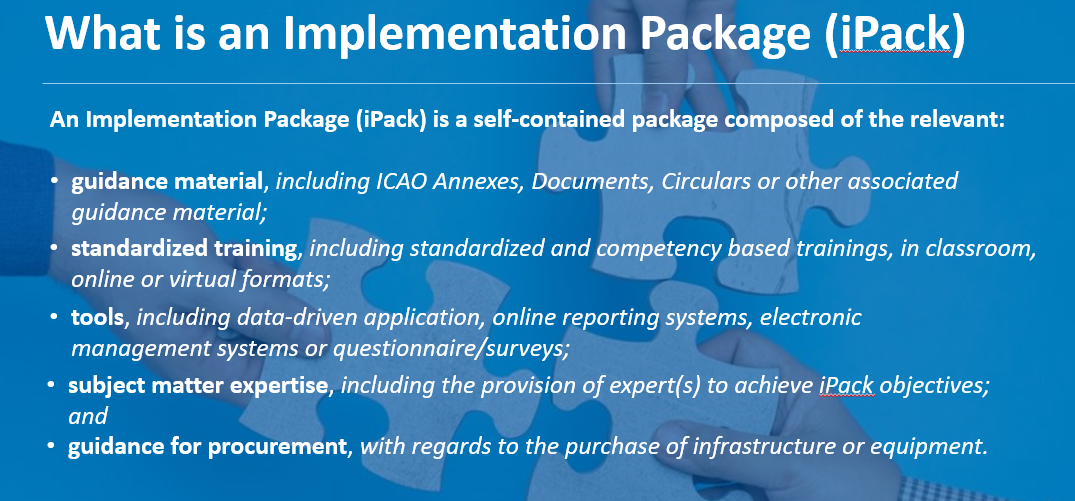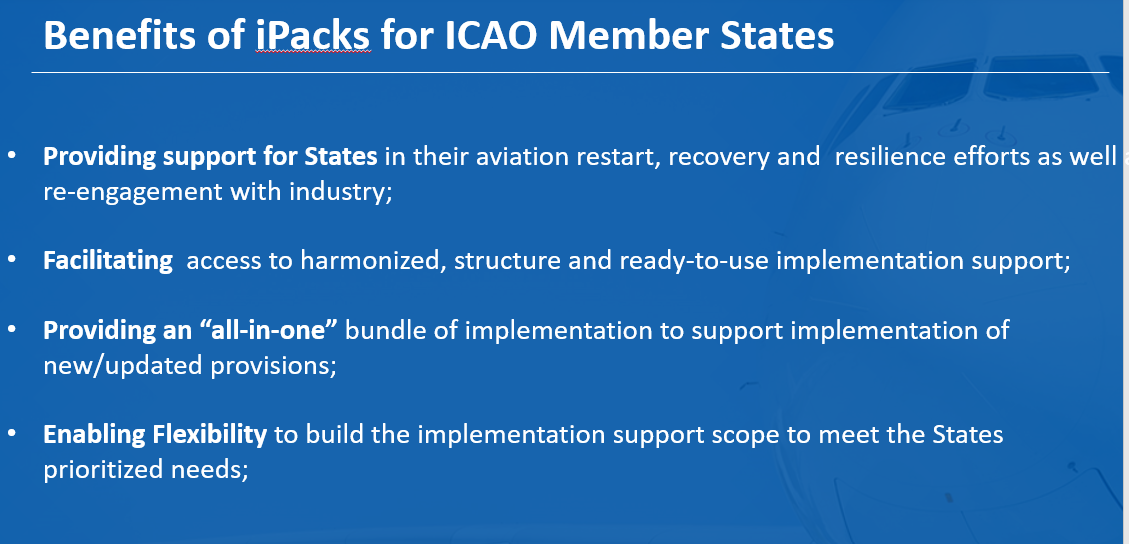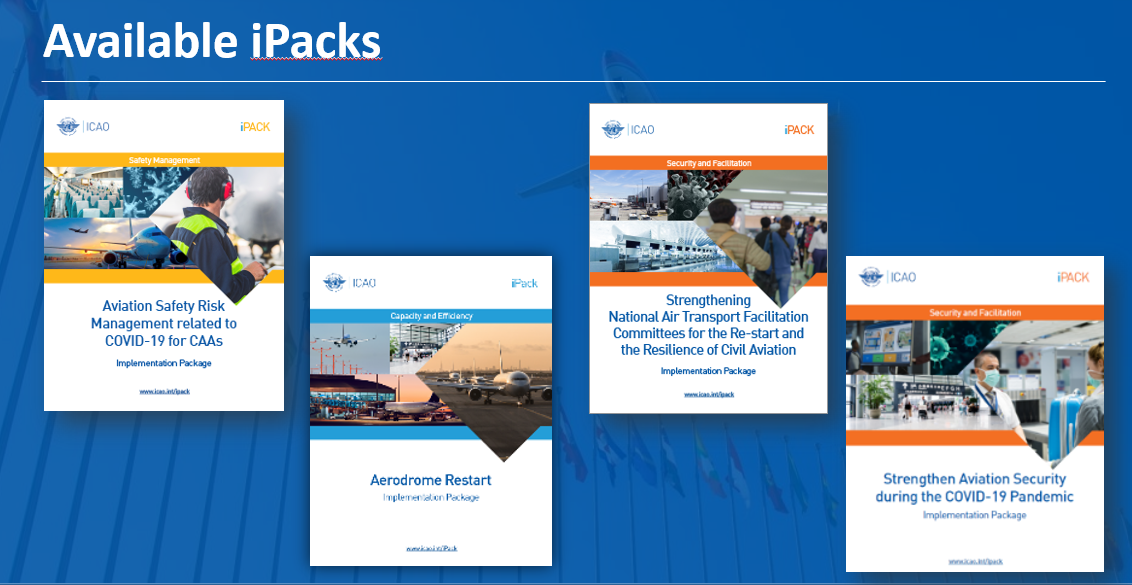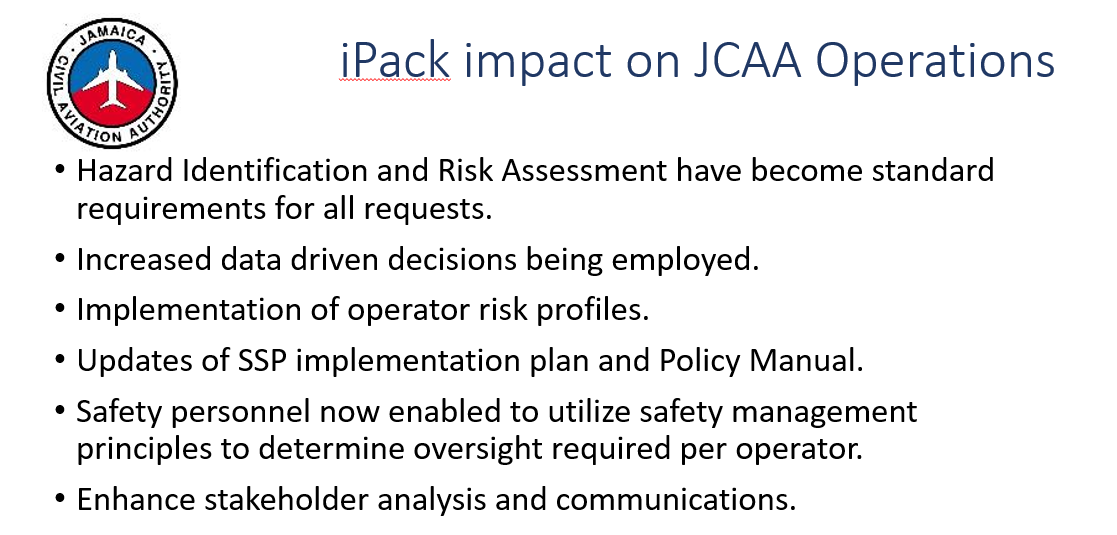There isn’t an industry around the world that hasn’t been affected by the COVID-19 pandemic. Travel restrictions and shutdowns will have a profound and lingering effect on air transport; the challenges with moving goods, and ensuring the health of passengers, called for continued relief measures. With so many different aspects to consider – public health-related measures, facilitation and aviation security, aviation safety (e.g. management of temporary regulatory alleviations), risk management, and air transport and economics – ICAO took a coordinated response to support Member States in the recovery phase of the COVID-19 pandemic. This industry is resilient.
In this edition of the ANC Talks series, ICAO’s ICAO Technical Cooperation Bureau (TCB), together with the Air Navigation Bureau (ANB) and Air Transport Bureau (ATB), provided a presentation on the development, deployment and impact of ICAO Implementation Packages (iPacks). Mr. Jorge Vargas, Director of TCB, opened the session, with presentations made by Mr. Marco Merens, Chief, Implementation Support (ANB) and Mr. Mekki Lahlou, Head, Training Operations, Global Aviation Training (TCB).
These presentations were followed by testimonials from senior officials of Civil Aviation Authorities: Ms. Tracey Forde-Bailey, Director of Civil Aviation, Barbados Civil Aviation Department; Mr. Nari Williams-Singh, Director General, Civil Aviation Authority of Jamaica; and Mr. Rajan Pokhrel, Director General, Civil Aviation Authority of Nepal (Nepal). It was closed by Mr. Stephen P. Creamer, Director of ANB and Mr. Mohamed Rahma, Director of ATB. The session was moderated by Mr. Nabil Naoumi, the President of the Air Navigation Commission.
Technical Cooperation Bureau
ICAO’s Technical Cooperation Programme provides advice and assistance in the development and implementation of projects across the full spectrum of civil aviation, to support States in the implementation of ICAO Standards and Recommended Practices (SARPs). Their efforts are focused on the safety, security, environmental protection and sustainable development of national and international civil aviation. The Programme is conducted under the broad policy guidance of the ICAO Assembly and the Council. As part of ICAO, a non-profit organization, TCB offers services under the most favorable and cost-effective condition and guarantees strict neutrality, objectivity and transparency, since it does not represent any particular national or commercial interest, nor the interest of any donor in general. Its advice is, therefore, governed by objective technical and financial considerations. To date, TCB has assisted in over 115 States and deploys approximately 1200 international and national experts every year.
Air Navigation Bureau
The Air Navigation Bureau manages the Safety and Air Navigation Capacity and Efficiency strategies of ICAO in a partnership with aviation stakeholders. This work is carried out within a framework with the following elements:
- Policy and Standardization,
- Safety and Infrastructure Monitoring,
- Safety and Infrastructure Analysis, and
- Safety and Infrastructure Implementation.
This Bureau leads ICAO’s crisis and contingency efforts.
Air Transport Bureau
The Air Transport Bureau supports the implementation of the Strategic Objectives of ICAO in particular, Security and Facilitation; Economic Development of Air Transport; and Environmental Protection. This Bureau also contributes towards Safety. The Bureau works under the direction of the Council, Air Transport Committee, the Committee on Unlawful Interference and the Committee on Joint Support of Air Navigation Services. Secretariat support is provided to the Committee on Aviation Environmental Protection (CAEP), which is a Committee of Council.
What is an Implementation Package (iPack)?
In light of the unprecedented impact, COVID-19 is inflicting on the air transport industry, ICAO’s coordinated response in supporting the Member States in their implementation efforts regarding recovery and preparedness for a Public Health Event of International Concern (PHEIC) is critical.
An iPack is a bundle of standardized guidance material, training, tools and expert support which aim to facilitate and guide the implementation of ICAO provisions for State entities (e.g. Governments, Civil Aviation Authorities, National Air Transport Facilitation Committees), aviation service providers, supply chain stakeholders and their personnel.
iPacks, in essence, represent the support that would have been typically provided to the Member States by the physical deployment of ICAO experts. These services are funded by donor States and Organizations and are also available to be acquired by States. Nepal was one of the first States to be identified as a priority State by the ICAO Bangkok Regional Office and supported by ICAO Headquarters. This support addresses their needs as they cope with the challenges caused by the COVID-19 pandemic.
iPacks are developed and implemented in full alignment with the measures and recommendations contained in the Council Aviation Recovery Task Force (CART) Report and are a key element for their implementation.
![]() The impact of iPacks
The impact of iPacks
ICAO’s role in supporting Member States in their efforts to implement relevant SARPs and up-to-date guidance material is paramount. As such, iPacks are intended to:
- ensure States’ COVID-19 implementation activities are aligned with the measures and recommendations contained in the CART Report and the most up-to-date ICAO provisions leading them to enhance their safety, air navigation, aviation security/facilitation, or economic development actions most seamlessly and efficiently and are in line with international and national requirements and guidance related to public health;
- ensure States’ COVID-19 implementation activities, although flexible, facilitate mutual acceptance by other States; and
- support States in their aviation re-start, recovery, and resilience efforts and their re-engagement with their aviation industry.
Further information on iPacks can be accessed here. Regional Offices are also available to assist with the identification and deployment of relevant iPacks to Member States.
The iPack Initiative: The Barbados’ Civil Aviation Department Experience
The Subject Matter Experts (SMEs)
SMEs played a valuable role in the process. They provided guidance where necessary and were a reliable source that could explain the concepts and address queries. They made the process easier than anticipated.
Integrated Training Programmes
- workshops and courses provided valuable insight into what is expected of the entity, the departments and States;
- iPacks provided State with tools to weather anticipated challenges;
- iPacks provided a foundation to further expand the State’s knowledge base; and
- this knowledge can be used beyond the initiative.
Engagement and Cooperation
- multiple platforms were used to communicate the knowledge;
- a variety of exercises were used to test and cement knowledge acquisition and retention;
- plans were adapted as necessary, flexibility was encouraged; and
- participating States were courteous, helpful and willing to provide feedback.
Opportunities
- knowledge acquisition through training;
- guidance for successful State Safety Programme (SSP) implementation;
- networking with other States and SMEs;
- improved prospects to help identify weaknesses in procedures and processes; and
- cohesiveness in training initiatives for the SSP coordination groups.
Impact on local Processes
- the SSP reviewed with a more discerning eye;
- a comprehensive understanding of what is required of aviation during a global crisis;
- underscored the importance of good communication, collaboration and cooperation practices with stakeholders;
- the importance of taking a project management approach to processes for effective implementation;
- the importance of being proactive rather than reactive; and
- enhanced focus on organizational review for improvement.
 The iPack Initiative: Jamaica’s Experience, iPack Launch – COVID 19 Recovery
The iPack Initiative: Jamaica’s Experience, iPack Launch – COVID 19 Recovery
iPack Deployment Experience
In general, it has been a very positive experience with a fruitful outcome. Although Jamaica was initially apprehensive about the relevance of the programme, ICAO’s website contained information explaining the objectives which complemented with communications from the Headquarters and the North American, Central American and Caribbean (NACC) Regional Office it increased their confidence in the proposed programme.
As operations restarted in Jamaica in June 2020, the JCAA valued the timeliness of the iPack deployment, which encouraged them to take further action in their already planned implementation. The training provided by ICAO was welcome knowledge that filled the gaps of their operational personnel especially in project management and safety management.
- exposure/connections to SMEs;
- collaboration with the Regional States;
- guided to relevant documentation; and
- confirmation of restart techniques used.
 Nepal took precautionary measures for the spread of COVID-19 by air transport before the Government of Nepal declared a formal lockdown from 24 March 2020. Only medical flights, repatriation flights, humanitarian flights and cargo flights were permitted during the lockdown period. Nepal followed all actions required in various ICAO States Letters concerning the COVID-19 pandemic and they adhered to the guidance in the ICAO CART report and CART takeoff guidance. The Nepal Civil Aviation Authority issued guidance material to all aviation stakeholders to ensure safe operations amid the pandemic.
Nepal took precautionary measures for the spread of COVID-19 by air transport before the Government of Nepal declared a formal lockdown from 24 March 2020. Only medical flights, repatriation flights, humanitarian flights and cargo flights were permitted during the lockdown period. Nepal followed all actions required in various ICAO States Letters concerning the COVID-19 pandemic and they adhered to the guidance in the ICAO CART report and CART takeoff guidance. The Nepal Civil Aviation Authority issued guidance material to all aviation stakeholders to ensure safe operations amid the pandemic.
A State Letter in this regard was received in October requesting the nomination of focal point and completion of needed analysis questionnaire. Nepal accepted the proposal. The Chief of Flight Safety Standard Department was nominated as the focal point and completed the required assessment questionnaire.
The needs-analysis tool questionnaire was completed with joint efforts of officials of flight safety, ANS safety and aerodrome safety departments to reflect the actual situation and need of State.
The Focal Point of CAA Nepal maintained regular contact with designated ICAO officials for the deployment of this project. The kickoff meeting among the officials of CAA Nepal, ICAO TCB, ICAO APAC officials and subject matter expert paved the way for mutually agreed dates for the effective deployment of the iPack. The regular communication between Nepal’s focal point and ICAO’s TCB official was beneficial for effective coordination and planning of activities.
Opportunities
The deployment of iPacks was an opportunity for the Nepal CAA officers to gain insight into the ICAO guidance materials on a restart during the pandemic. Officials from many domains (PEL, OPS, AIR, ANS, AGA, SMS, AVSEC, FAL, as well as other agencies like public health authorities) received useful training and attended workshops during the deployment.
ICAO started with sixteen deployments globally and twenty-two States currently projected to benefit from iPacks. There are more States than the actual number of deployments because some iPacks are delivered to a group of States.
The five Key Stakeholders in the iPack Deployment Process include: Implementation Management (TCB); a State Focal Point; a Deployment Subject Matter Expert; ICAO Headquarters Focal Points (ANB/ATB) and the Regional Office Focal Point.
A webinar was conducted to provide additional information about iPacks. Please click here to view the complete recording of the iPack webinar.








